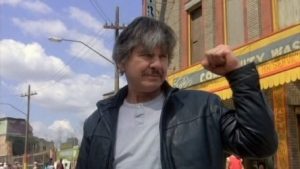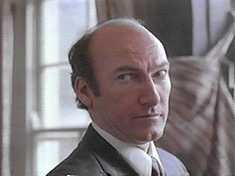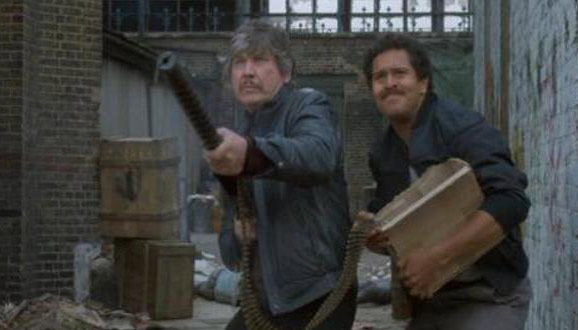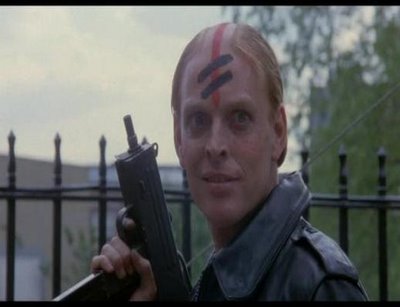Kathyrn Davis
As the film’s resident do-gooder, hers is the life of Hobbesian brutishness; owlish idealism in a modestly furnished, curiously cheerless basement apartment, save for the twilight rendezvous that pre-dates her violent, fiery death by mere hours. Taking pity on dear Paul as if his arm-length rap sheet transformed a murderer’s heart into a puppy’s nuzzling nose, she sizes him up, rails against a broken system, and ingests what remains of Kersey’s ebbing bodily fluids, all with the resigned hunger of a woman who knows this is her last shot to feel a man press her down into a cheap mattress, even if he’s mustier corpse than gentleman caller.
As played by Deborah Raffin, with eyes just this side of twinkly despair, Miss Davis is the film’s unbreakable misogyny made flesh, where women exist to scream in agony, bare chocolate breasts as the hot breath of rape lurks around every corner, and re-energize our heroes so they might continue their righteous butchery. Shes also the cinemas’ final word on the efficacy of social work, where bookish liberals take their clipboards teeming with hope and meet their end via the sucker punch of urban lawlessness. It helps, too, to own the one car in Christendom that explodes on impact at a speed approximating a late-morning jog.
Richard Shriker
He’s the only cop worth a damn, striking deals with vigilantes as if negotiating sick pay with the teacher’s union. He wants bodies on slabs, and he wants them now, even if a few of them are goofy cops who haven’t the sense to drive into a war zone with bulletproof vests or weaponry exceeding the power of cap guns. And his refrain — I’m a cop, which means I get to violate your Constitutional rights, evokes the unvarnished masculinity of the Gipper era with tear-down-that-wall efficiency, but also speaks to any age that sacrifices its nutsack on a pyre of limp wrists and liberal equivocation.
Fortunately, Shriker saves the best for last, as he damns the torpedoes, his badge, and any hope of escaping a life sentence in Rikers in order to join Kersey for the worlds’ most delightful turkey shoot. That final massacre, Michael Winners own personal reimagining of Grenada, is Paul’s catharsis, yes, but its Richards’ hard-on; a desk guys’ fevered orgy of revenge for every tortured cold call he had to make raising money for the policeman ball. With a scowl barely masking that newly found grin of a life finally lived, Shriker regains his inspiration for ever joining the thin blue line in the first place. He even lets Paul go at the end, as if to insist that he take credit, bask in the glory, and hastily announce his run for office as the Murderin’ Mayor.
Justice
An abstraction to some, an impossibly distant dream to others, it is finally given its tangibility at last in Kersey’s New York. For one screeching black mama who waves her arms at death as if asking for an encore, it means that the man who stole her purse can die with a basketball-sized hole in his chest, once again setting the universe back on course. “I’m glad he’s dead!”, she shrieks, singing the heavenly chorus of victims everywhere, and also boldly equating the loss of a few dollars in food stamps with capital murder.
But her joy is nonetheless infectious, and we share in her religious fervor. For Kersey, every killing is, of course, a cry against those who were never called to account for ending his late wife’s earthly journey with spray paint, rape, and callous humiliation, but in each scene, he kills for nothing more than a cheap automobile, or even the loss of a lousy camera. “It’s my car!’, he protests, defending property rights in the only manner available to a man not twisted by feminism and homosexuality. Unarmed, fleeing, or even bowed in surrender, all must die for the crimes of others, or perhaps what they too will one day commit. Guilt is assumed, and not even God would dare sort them out.
Oh, What a Time
Was that really America? Where we could order elephant guns through a PO Box, which itself handed over its keys without bothering to ask for a name, let alone a form of ID? When a broken arm led to death because to be raped under Reagan was an admission that the pussy was acquiring too much power? Or when cowardly Mexican men sent their wives to the corner store ALONE because the daily gunshots, streets littered with trash, endless sexual assaults, muggings, and burning cars weren’t enough to clue you in that a woman by herself, and with nice tits to boot, just might be kidnapped by a roving gang of thieves, punks, killers, and rapists? When the biggest jugs we’ve ever seen in an action movie belong to a dehumanized black prostitute who AVOIDS rape because she’s sleeping with the director? All that, and the only time on record where a young black man was just as likely to fall from a roof to his death as receive a bullet in the head.
Chuck Cunningham, Esq.
Gavan O’Herlihy, Manny Fraker to you and me, gave up the green pastures and fat paychecks of Happy Days to play, if not inhabit, the era’s foremost villain. From his reverse Mohawk to crayola-inspired war paint, Fraker is exa’rayolaat the genre needed, and was the perfect foil to Kersey’s running commentary of righteous bloodlust. From the moment he sees Paul in the jail cell and has his lackeys bust the old man’s chops, he’s clearly in charge, using that brief interlude to convey one of the film’s most precious nuggets: “Tell you what, I’m gonna kill a little old lady, just for you Watch it on the six o-clock news.” And I’ll be damned if he doesn’t do exactly that.
He kills members of his own gang simply to exert power, has committed the entire neighborhoods’ phone numbers to memory (his initial call to Paul, asking, “Hey, what are ya doin” in there?” is a classic, considering that it comes about 15 minutes after he butchered Paul’s best friend in that very apartment), and lays claim to a queer sense of morality (despite killing dozens, he is outraged when Paul does likewise).
He’s the oddest duck to control so diverse an urban gang, as he lacks the usual physical appeal and charisma, but upon his death, unseen to everyone in the street, he elicits screams of woe from his flock, as if they could sense a world without his soul. But when he dies, the violence stops forever, and the city is once again returned to kindly Jews, entrepreneurs, and Korean War vets with the pull to sneak home weaponry usually reserved for bringing down entire tank divisions.
Please check out these other Death Wish 3 reviews and rants:
The Unsung Heroes of Death Wish 3
The Deaths of Death Wish 3
Death Wish 3: 80’s Action Edition
Death Wish 3: Matt’s iconic review
The ABC’s of Death Wish 3
80’s Action Hall of Fame: Fraker in Death Wish 3




